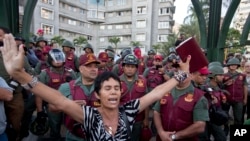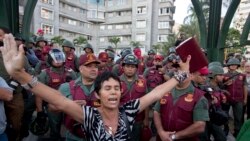The United States is concerned over the shrinking space for civil society around the world.
In a statement to the 25th session of the United Nations Human Rights Council in Geneva, Paula Schriefer, U.S. Deputy Assistant Secretary of State for International Organization Affairs and Head of Delegation, said that progress “depends on the ability of individuals to coalesce around shared goals and harness the power of their convictions. History and current events demonstrate that nations that respect the rights of all their populations are more just, prosperous and secure.”
But, Ms. Schriefer noted, every day journalists and human rights activists report how representatives of civil society are beaten, tortured, and sometimes murdered for expressing opinions and assembling peacefully together. And, she said, restrictions on the rights of freedom of expression and of peaceful assembly and association are instrumental in leading to violence and abuse.
Deputy Assistant Secretary Schriefer cited several areas of concern.
In Venezuela, she said, the government is suppressing what began as peaceful demonstrations by students upset with high levels of crime. In efforts to quell the spreading nationwide protests, the government sent troops “to use live ammunition against the people, shut down foreign media, the internet and social media, and arrested an opposition political leader and protesters without due process.”
Ms. Schriefer said these actions contradict the government’s commitment to respect the rights to freedom of assembly and expression. She urged that “trusted third parties facilitate the conversation, as Venezuelans search for solutions to end the violence and deal with political division in a democratic fashion.”
In other parts of the world, restrictive laws are hindering civil society’s ability to operate. Ms. Schriefer pointed to Egypt where the law limits organizations’ operations and their ability to receive foreign funding; to Uzbekistan, where a December decree, supposedly aimed at simplifying registration procedures, resulted in NGOs becoming subject to onerous tax inspections and extensive requirements for governmental approval; to Nigeria, where a recent law criminalizes attending or organizing meetings related to LGBT persons. In addition, many countries, Ms. Schriefer noted, are enacting restrictive Internet regulations and have increased detentions and lengthy prison terms for bloggers.
“This is a critical moment,” Deputy Assistant Secretary Schriefer said to the Council, “for member states to redouble our efforts to stand with civil society in the promotion and protection of human rights and fundamental freedoms and the pursuit of democratic progress.”
In a statement to the 25th session of the United Nations Human Rights Council in Geneva, Paula Schriefer, U.S. Deputy Assistant Secretary of State for International Organization Affairs and Head of Delegation, said that progress “depends on the ability of individuals to coalesce around shared goals and harness the power of their convictions. History and current events demonstrate that nations that respect the rights of all their populations are more just, prosperous and secure.”
But, Ms. Schriefer noted, every day journalists and human rights activists report how representatives of civil society are beaten, tortured, and sometimes murdered for expressing opinions and assembling peacefully together. And, she said, restrictions on the rights of freedom of expression and of peaceful assembly and association are instrumental in leading to violence and abuse.
Deputy Assistant Secretary Schriefer cited several areas of concern.
In Venezuela, she said, the government is suppressing what began as peaceful demonstrations by students upset with high levels of crime. In efforts to quell the spreading nationwide protests, the government sent troops “to use live ammunition against the people, shut down foreign media, the internet and social media, and arrested an opposition political leader and protesters without due process.”
Ms. Schriefer said these actions contradict the government’s commitment to respect the rights to freedom of assembly and expression. She urged that “trusted third parties facilitate the conversation, as Venezuelans search for solutions to end the violence and deal with political division in a democratic fashion.”
In other parts of the world, restrictive laws are hindering civil society’s ability to operate. Ms. Schriefer pointed to Egypt where the law limits organizations’ operations and their ability to receive foreign funding; to Uzbekistan, where a December decree, supposedly aimed at simplifying registration procedures, resulted in NGOs becoming subject to onerous tax inspections and extensive requirements for governmental approval; to Nigeria, where a recent law criminalizes attending or organizing meetings related to LGBT persons. In addition, many countries, Ms. Schriefer noted, are enacting restrictive Internet regulations and have increased detentions and lengthy prison terms for bloggers.
“This is a critical moment,” Deputy Assistant Secretary Schriefer said to the Council, “for member states to redouble our efforts to stand with civil society in the promotion and protection of human rights and fundamental freedoms and the pursuit of democratic progress.”






